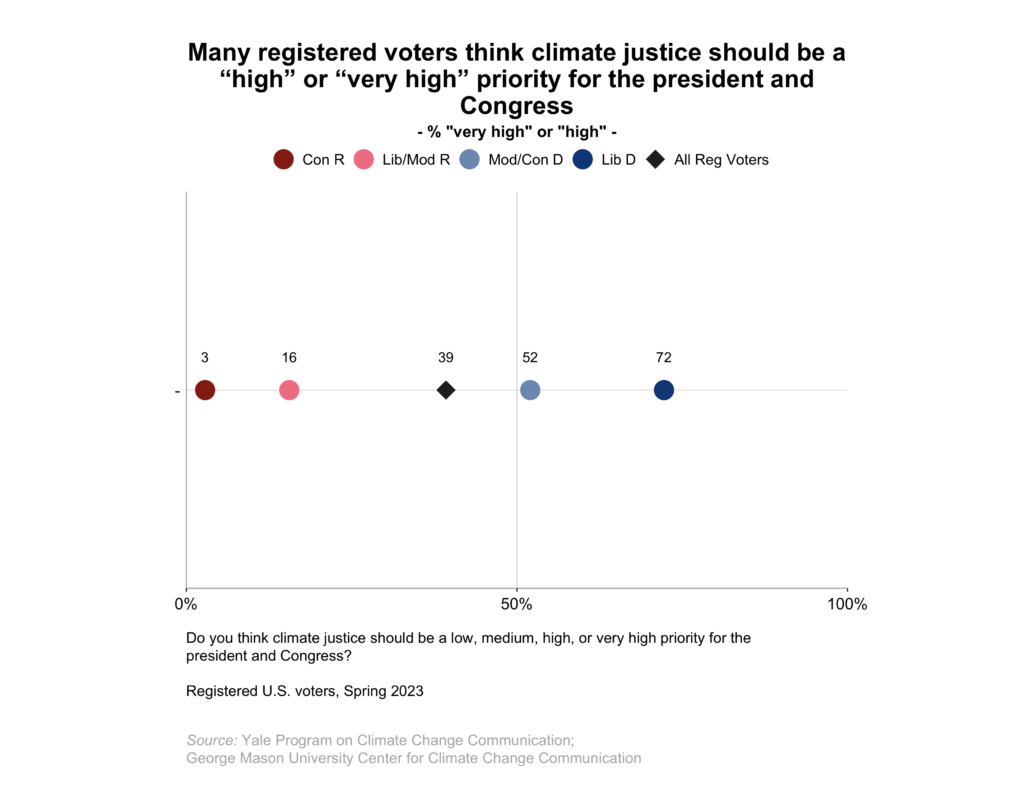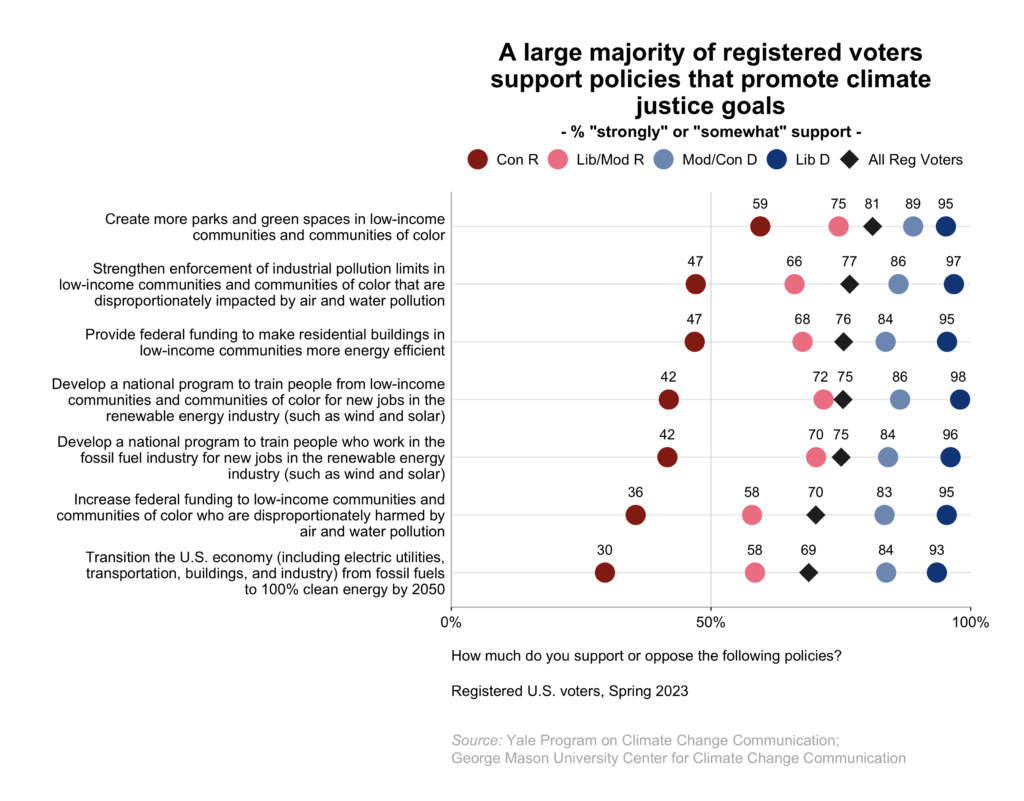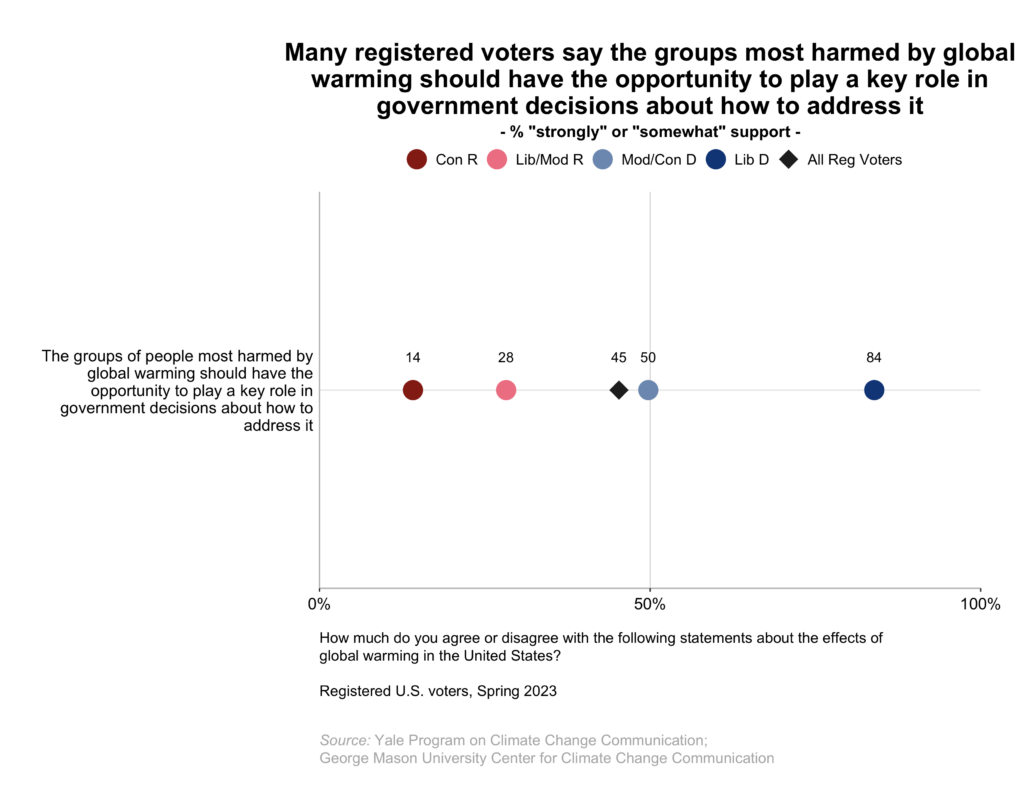Report · Sep 12, 2023
Climate Change in the American Mind: Climate Justice, Spring 2023
By Jennifer Carman, Matthew Ballew, Danning (Leilani) Lu, Anthony Leiserowitz, Edward Maibach, Seth Rosenthal, John Kotcher, Emily Goddard, Joshua Low, Jennifer Marlon, Marija Verner, Sanguk Lee, Teresa Myers, Matthew Goldberg, Nicholas Badullovich, Tracy Mason, Andrea Aguilar, Sha Merirei Ongelungel, Karina Sahlin, Cristian Sanchez, Irene Burga, Mark Magaña, Saad Amer, Romona Taylor Williams, Montana Burgess, Grace McRae, Makeda Fekede, Manuel Salgado, Annika Larson, Kristin Barendregt-Ludwig, Michel Gelobter and Gerald Torres
Filed under: Beliefs & Attitudes
3. Registered Voters’ Support for Climate Justice Policies
3.1. Many registered voters think climate justice should be a “high” or “very high” priority for the president and Congress.
After reading a brief description of climate justice, about four in ten registered voters (39%) think climate justice should be a “high” or “very high” priority for the president and Congress (refer to data tables, p. 25). This includes a majority of liberal Democrats (72%) and about half of moderate/conservative Democrats (52%), but fewer moderate/conservative Republicans (16%) and conservative Republicans (3%).

3.2. A large majority of registered voters support policies that promote climate justice goals.
A large majority of registered voters across the political spectrum support a variety of policies that promote climate justice goals, including the following (refer to data tables, pp. 26-28):
- Creating more parks and green spaces in low-income communities and communities of color: 81% of registered voters, including 95% of liberal Democrats, 89% of moderate/conservative Democrats, 75% of liberal/moderate Republicans, and 59% of conservative Republicans.
- Strengthening enforcement of industrial pollution limits in low-income communities and communities of color that are disproportionately impacted by air and water pollution: 77% of registered voters, including 97% of liberal Democrats, 86% of moderate/conservative Democrats, 66% of liberal/moderate Republicans, and 47% of conservative Republicans.
- Providing federal funding to make residential buildings in low-income communities more energy efficient: 76% of registered voters, including 95% of liberal Democrats, 84% of moderate/conservative Democrats, 68% of liberal/moderate Republicans, and 47% of conservative Republicans.
- Developing a national program to train people from low-income communities and communities of color for new jobs in the renewable energy industry (such as wind and solar): 75% of registered voters, including 98% of liberal Democrats, 86% of moderate/conservative Democrats, 72% of liberal/moderate Republicans, and 42% of conservative Republicans.
- Developing a national program to train people who work in the fossil fuel industry for new jobs in the renewable energy industry (such as wind and solar): 75% of registered voters, including 96% of liberal Democrats, 84% of moderate/conservative Democrats, 70% of liberal/moderate Republicans, and 42% of conservative Republicans.
- Increasing federal funding to low-income communities and communities of color who are disproportionately impacted by air and water pollution: 70% of registered voters, including 95% of liberal Democrats, 83% of moderate/conservative Democrats, 58% of liberal/moderate Republicans, and 36% of conservative Republicans.
- Transitioning the U.S. economy (including electric utilities, transportation, buildings, and industry) from fossil fuels to 100% clean energy by 2050: 69% of registered voters, including 93% of liberal Democrats, 84% of moderate/conservative Democrats, 58% of liberal/moderate Republicans, and 30% of conservative Republicans.

3.3. Many registered voters say the groups most harmed by global warming should have the opportunity to play a key role in government decisions about how to address it.
More than four in ten registered voters (45%) agree that the groups most harmed by global warming should have the opportunity to play a key role in government decisions about how to address it. This includes a large majority of liberal Democrats (84%), half of moderate/conservative Democrats (50%), 28% of liberal/moderate Republicans, and 14% of conservative Republicans.
